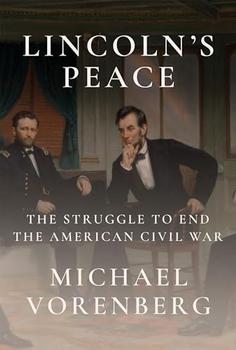
The Struggle to End the American Civil War
by Michael Vorenberg
One historian's journey to find the end of the Civil War—and, along the way, to expand our understanding of the nature of war itself and how societies struggle to draw the line between war and peace.
We set out on the James River, March 25, 1865, aboard the paddle steamboat River Queen. President Lincoln is on his way to General Grant's headquarters at City Point, Virginia, and he's decided he won't return to Washington until he's witnessed, or perhaps even orchestrated, the end of the Civil War. Now, it turns out, more than a century and a half later, historians are still searching for that end.
Was it April 9, at Appomattox, as conventional wisdom holds, where Lee surrendered to Grant in Wilmer McLean's parlor? Or was it ten weeks afterward, in Galveston, where a federal commander proclaimed Juneteenth the end of slavery? Or perhaps in August of 1866, when President Andrew Johnson simply declared "the insurrection is at an end"? That the answer was elusive was baffling even to a historian of the stature of Michael Vorenberg, whose work served as a key source of Steven Spielberg's Lincoln. Vorenberg was inspired to write this groundbreaking book, finding its title in the peace Lincoln hoped for but could not make before his assassination. A peace that required not one but many endings, as Vorenberg reveals in these pages, the most important of which came well more than a year after Lincoln's untimely death.
To say how a war ends is to suggest how it should be remembered, and Vorenberg's search is not just for the Civil War's endpoint but for its true nature and legacy, so essential to the American identity. It's also a quest, in our age of "forever wars," to understand whether the United States's interminable conflicts of the current era have a precedent in the Civil War—and whether, in a sense, wars ever end at all, or merely wax and wane.
"A brilliant work and a vital contribution to the canon...Vorenberg exhibits scholarship of the first order. The history is vividly written and thoroughly researched. His reasoned questioning, skepticism, and analysis of accepted tropes and conclusions about the Civil War will prove meaningful to those who study the philosophy and psychology of war, peace, and American culture and identity." —Kirkus Reviews (starred review)
"[Vorenberg] astutely interrogates the notion that modern America is uniquely mired in 'forever wars,' suggesting instead that today's political scientists are likely idealizing the past. Expert analysis and eloquent prose make this a must-read for U.S. history buffs." —Publishers Weekly (starred review)
"Vorenberg tells this story deftly, managing a number of related narratives involving dozens of people in the years when the Lost Cause myth had not yet become the dominant Civil War and Reconstruction story. This fine book ably challenges many untested assumptions about the Civil War." —Booklist
"Long after Robert E. Lee surrendered to Ulysses S. Grant in April 1865, Americans continued to ask themselves whether the Civil War was truly over. In this thoroughly surprising and beautifully written narrative, Michael Vorenberg takes us on a journey through multiple surrenders and declarations of peace, ongoing guerilla warfare, and the unceasing fight for Black freedom. In an age of 'forever wars,' Lincoln's Peace tells a story as timely as it is thought-provoking." —Martha Hodes, author of Mourning Lincoln
"Michael Vorenberg's Lincoln's Peace fundamentally changes the way we think about the Civil War's chronology, geography, and meaning. Through clear vision and beautiful prose, Vorenberg suggests that the conflict had no neat ending, that it lingered long past Robert E. Lee's formal surrender at Appomattox Courthouse on April 9, 1865, that it raged in the trans-Mississippi West for years afterward, and that it continues to shape the American experience today. This is an essential book by one of our greatest historians." —Ari Kelman, author of A Misplaced Massacre: Struggling Over the Memory of Sand Creek
This information about Lincoln's Peace was first featured
in "The BookBrowse Review" - BookBrowse's membership magazine, and in our weekly "Publishing This Week" newsletter. Publication information is for the USA, and (unless stated otherwise) represents the first print edition. The reviews are necessarily limited to those that were available to us ahead of publication. If you are the publisher or author and feel that they do not properly reflect the range of media opinion now available, send us a message with the mainstream reviews that you would like to see added.
Any "Author Information" displayed below reflects the author's biography at the time this particular book was published.
Michael Vorenberg is a professor of history at Brown University, in Providence, Rhode Island. He is the author of Final Freedom: The Civil War, the Abolition of Slavery, and the Thirteenth Amendment, which was a finalist for the Lincoln Prize and a key source for Steven Spielberg's 2012 film, Lincoln. He is also the author of The Emancipation Proclamation: A Brief History with Documents, as well as a number of essays on slavery, emancipation, and the U.S. Constitution. His writings have appeared in the Chicago Tribune, New York Times, Politico, and the Washington Post.
These are not books, lumps of lifeless paper, but minds alive on the shelves
Click Here to find out who said this, as well as discovering other famous literary quotes!
Your guide toexceptional books
BookBrowse seeks out and recommends the best in contemporary fiction and nonfiction—books that not only engage and entertain but also deepen our understanding of ourselves and the world around us.